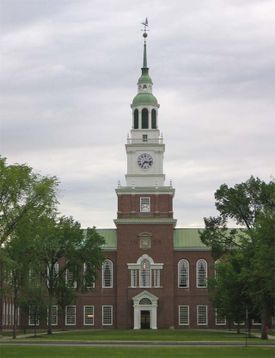In the wake of similar moves by its sister institutions in the Ivy League, Dartmouth announced today several major enhancements to its financial aid program.
First, it will offer free tuition to families with income below $75,000.
Second, it will replace all loans with scholarships or grants.
Third, it will extend need-blind admissions to international students (which currently represents about 7% of each incoming class.
Fourth, it will release financial aid recipients from the current requirement to earn at least $2950 during a leave term; this change will allow these same students to pursue unpaid research, community service, or internship opportunities that will enhance their educational and career prospects.
These initiatives add up to an increased commitment of $10 million in financial aid, on top of the $61 million per year the College now awards.
As an alumnus, I’m proud that my alma mater is able to increase its financial aid to continue to attract the best and brightest who seek a quality liberal arts experience. Perhaps I had better increase my annual gift!
Mark Montgomery
Montgomery Educational Consulting
UPDATE:Â The New York Times reported Dartmouth’s changes in financial aid policy here.
Warning: Your Facebook and MySpace Pages May Be Monitored
News from today’s Inside Higher Ed indicates that campuses are considering scouring students’ Facebook and MySpace pages for potentially harmful material, including drug references, foul language, and anything else that may hurt a college’s reputation.
Of course, the new technologies (including a product called YouDiligence, which is described in this story) that colleges may acquire to do this monitoring are raising questions among freedom of speech advocates, as well as the specter that “Big Brother” really is watching.
But in my experience, students are way too blasé about the content of their personal pages. References to drinking and drugs abound, foul language is common, and students routinely add widgets and applications without a thought as to how their personal information could be used by marketers or more nefarious individuals.
Further, students do not realize that technologically hip admissions officers are routinely looking at your Facebook and MySpace pages to see if there is anything that raises red flags about a particular applicant. Better safe than sorry: if you wouldn’t want your mom to see what you’re posting on those pages, better not to put it up there.
Mark Montgomery
Montgomery Educational Consulting
Why Attend the University of Rochester? One Man’s Response
As I explained in a previous post, I recently asked a group of friends about their experiences in selecting a college or university. One University of Rochester alumnus recounts here how he chose the college he attended.
“All other things being equal — good academics, financial aid, extracurricular activities. I was looking primarily for a school in New York State. Because I had a Regents Scholarship (state funded) that could only be used within New York. I applied early decision to my first choice (private school in NY) but didn’t get in. My guidance counselor was so annoyed, saying that if I had applied from Utah.
I would have been accepted in a minute but they didn’t want too many New Yorkers to overwhelm the class. He got on the phone — in my presence — called up the admissions office of another school. Read them my grades and scores and asked how I seemed as a candidate. They were positive, sent me the application and I got in.
This was the University of Rochester where I went to my 30th reunion last fall. It was a great experience and I’m always happy to praise the school.
When I deal with applicants now as an alumni recruiter. I tell them they should make sure the school has what they want academically and they should be self-starters, but knowing how to ask for help when they need it.
That’s what I think of as a “good match” at my school.
Applicants should think about whether they want to be in a city or in the middle of nowhere, or near a city but in an enclosed campus environment. Do they want a small intimate community or a large university setting? The academics come first, of course, but if you’re going to be living at school, you want to make sure the rest of it meets your needs as well.”
After attending U Rochester, this gentleman went on to law school. He is now a journalist and movie critic, and he teaches film at a local college.
Each person’s road to college is different, but usually they end with a happy result.
Mark Montgomery
Montgomery Educational Consulting



